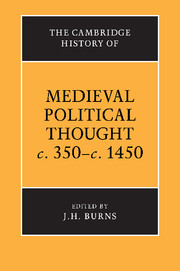Book contents
- Frontmatter
- Introduction
- I Foundations
- II Byzantium
- III Beginnings: c. 350–c. 750
- IV Formation: c. 750–c. 1150
- V Development: c. 1150–c. 1450
- 13 Introduction: politics, institutions and ideas
- 14 Spiritual and temporal powers
- 15 Law
- I Law, legislative authority, and theories of government, 1150–1300
- II Law, sovereignty and corporation theory, 1300–1450
- 16 Government
- 17 Community
- 18 The individual and society
- 19 Property and poverty
- Conclusion
- Biographies
- Bibliography
- Index of names of persons
- Index of subjects
- References
II - Law, sovereignty and corporation theory, 1300–1450
from 15 - Law
Published online by Cambridge University Press: 28 March 2008
- Frontmatter
- Introduction
- I Foundations
- II Byzantium
- III Beginnings: c. 350–c. 750
- IV Formation: c. 750–c. 1150
- V Development: c. 1150–c. 1450
- 13 Introduction: politics, institutions and ideas
- 14 Spiritual and temporal powers
- 15 Law
- I Law, legislative authority, and theories of government, 1150–1300
- II Law, sovereignty and corporation theory, 1300–1450
- 16 Government
- 17 Community
- 18 The individual and society
- 19 Property and poverty
- Conclusion
- Biographies
- Bibliography
- Index of names of persons
- Index of subjects
- References
Summary
The period from the late thirteenth century to the mid-fifteenth occupies a particularly important position in the history of the juristic contribution to political thought, because in it there emerged the school of the Commentators, which was the culmination of medieval civilian jurisprudence, and as such was to exert a profound influence on early modern political thought. These years also produced major canonists building on the achievements of the thirteenth century. Juristic theory deeply influenced political ideas in three areas in particular. First, jurists developed further the theme of the relationship between positive law and the overall normative structure within which they considered human law and government operated: that is to say, the relationship between the will of the law-makers (whether emperor, pope, king, signore, or people) and the limitations posed by fundamental laws. The other two aspects relate to the jurists' response to the contemporary political phenomenon of the emerging territorial state. They consolidated theories of territorial sovereignty, in the case of kingdoms developing further theories which had originated towards the end of the twelfth century, and in that of city-republics producing innovations in juristic terms. Furthermore they made crucial advances in corporation theory producing thereby a specifically juristic contribution to the emergence of the idea of the state.
The normative context of human law and government
The role of fundamental norms
That these jurists should have accepted such a normative structure was only to be expected: it was, after all, a basic presupposition of the juristic tradition and of medieval thought about law and society with, as we shall see, the possible and notorious exception of the views of Marsilius of Padua.
- Type
- Chapter
- Information
- The Cambridge History of Medieval Political Thought c.350–c.1450 , pp. 454 - 476Publisher: Cambridge University PressPrint publication year: 1988
References
- 27
- Cited by

